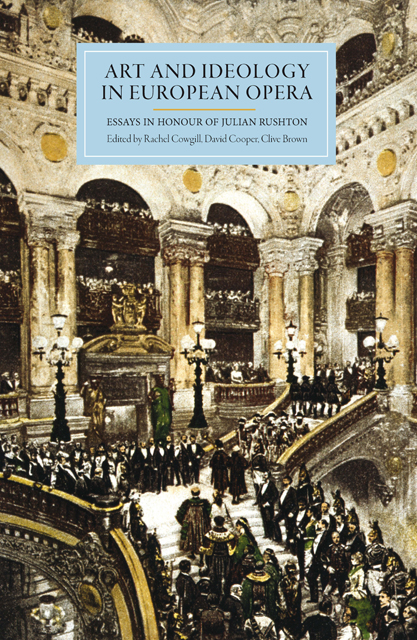Book contents
- Frontmatter
- Contents
- List of Figures
- List of Music Examples
- List of Tables
- Notes on Editors and Contributors
- Acknowledgements
- Introduction
- I Nationalism, Cosmopolitanism and National Opera
- II Opera, Class and the Politics of Enlightenment
- III Opera and Otherness
- Julian Rushton: A Family Memoir
- 7 The Works of Julian Rushton
- Index
- Tabula Gratulatoria
14 - Opera as Poetry: Bizet’s Djamileh and the Ironies of Orientalism
Published online by Cambridge University Press: 28 February 2023
- Frontmatter
- Contents
- List of Figures
- List of Music Examples
- List of Tables
- Notes on Editors and Contributors
- Acknowledgements
- Introduction
- I Nationalism, Cosmopolitanism and National Opera
- II Opera, Class and the Politics of Enlightenment
- III Opera and Otherness
- Julian Rushton: A Family Memoir
- 7 The Works of Julian Rushton
- Index
- Tabula Gratulatoria
Summary
Bizet's Djamileh, the one-act masterpiece that awaits wider recognition, lives mostly in our minds, and not in theatres. Even the literature devoted to it is meagre. Hugh Macdonald's eloquent, sometimes angry paragraphs concluding his ‘Bizet’ entry in New Grove exemplify a well-nigh inescapable feeling of the elegiac befitting any discussion of this composer's Nachlass. The sources for the opera with which I am most familiar reflect the absence of modern editions: an original libretto, a reprinted piano-vocal score deriving from the Choudens plates, and a recording from 1988 conducted by Lamberto Gardelli. Happily, this is the least problematic of Bizet's operas as regards accuracy of sources. A full score put out by Choudens (1892) is in the British Library, but the present essay does not attempt to discuss metaphors relative to orchestration and timbre. Winton Dean's wise words on Djamileh include a keen appreciation of Bizet's orchestration, alongside other evidence of Bizet's full operatic maturity; but I shall try and enlarge here on the following judgment in particular: ‘Bizet achieves what he attempted with only partial success in Les Pecheurs de perles [1863] – an exotic background that is interesting in itself and in complete harmony with the foreground’.
That for which Winton Dean has little time in his 1965 monograph – Djamileh's relation to its literary origins – will provide an essential backbone of my discussion, following which an oblique conclusion is the only one possible. His narrative lays the conundrum of the opera's public failure at the door of the source-poem, Namouna (1832) by Alfred de Musset. Dean's combined account of poem and opera is as follows:
Namouna [is] a reflectively amorous poem after the manner of Byron's Don Juan; hence its dramatic weakness. There is not much story, and what there is has little of the dramatic. Haroun [i.e. Musset's ‘Hassan’: ‘Haroun’ is his operatic reincarnation], a disillusioned voluptuary who proclaims his love for nothing except love itself, changes his mistress once a month […].
- Type
- Chapter
- Information
- Art and Ideology in European OperaEssays in Honour of Julian Rushton, pp. 303 - 326Publisher: Boydell & BrewerPrint publication year: 2010

